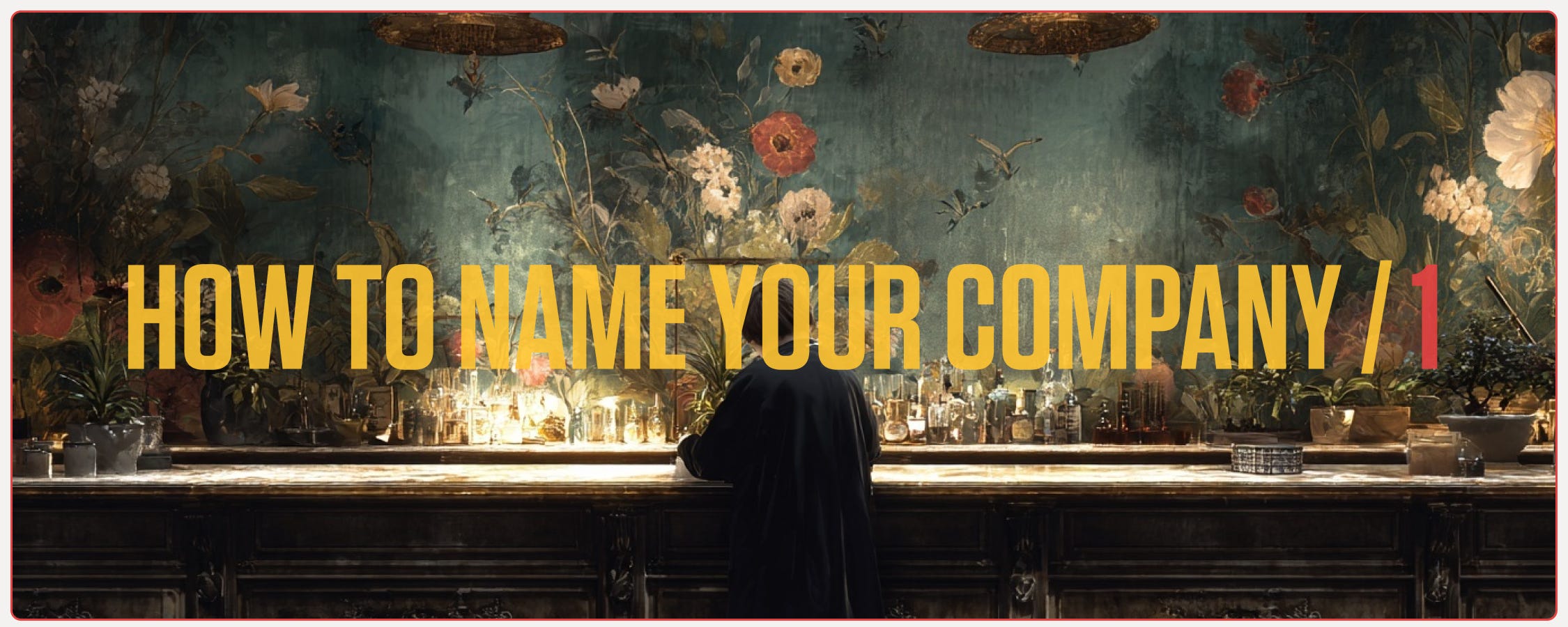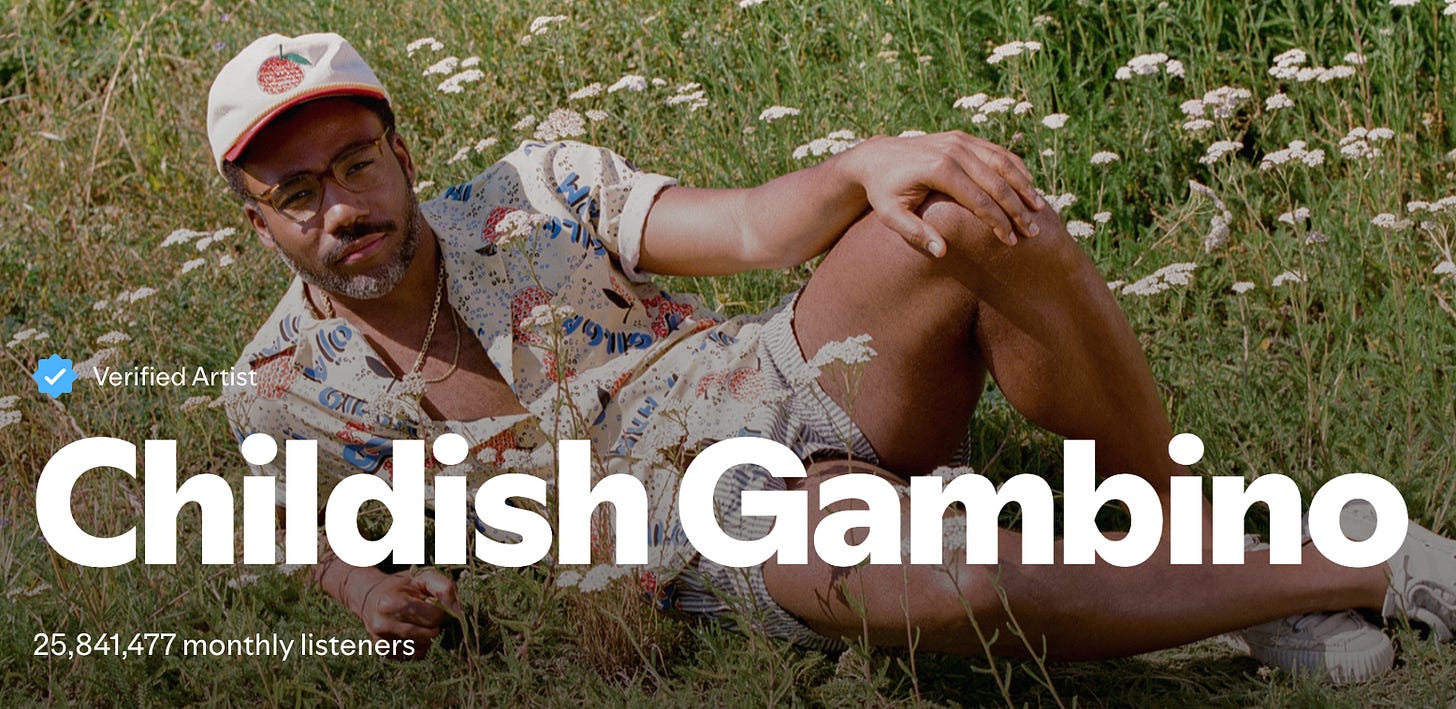How to Name Your Company, Part 1: Principles of the Right Name
Learn the foundations behind finding the best name for your startup.
Remember how easy it used to be to name things?
I remember creating my Wu Tang Name in 2004, and was so pumped when the generator gave me "Childish Gambino". It perfectly embodied my child-like nature along with my suburban white boy/gangster side.
In retrospect it seems like others might have received the same name:
Whether you're finding a name for your new rap persona, or attempting to name your shiny new start-up, naming is hard work.
For the weird ones, this is the most exciting time in a company’s life. It’s like choosing the name of your newborn (or puppy, for the sane in the bunch). You’re deciding how humanity will talk about your shiny new baby, for the long haul.
For others, it’s a moment of dread. The fear that one wrong name will doom every future mention to a chorus of giggles and a side of cringe. Imposter syndrome shows its beady little eyes, and insecurity kicks into overdrive.
After around 20 years of experience starting and naming brands and products, I’m convinced that with just a little time and elbow grease, anyone can find the right name for their company. My definition of the “right” name is one that is authentic, true to market, and timeless.
Authenticity
A good friend of mine in the early 2000s was a bassist for some pretty well-known bands. We were living in LA at the time, and I loved that each time I got to hang with him, I heard the latest “insider” information of what it was really like to play music for a living. Spoiler alert: it really, really sucks if you are not the 0.001%.
One thing I would notice every time we hung out was that his clothing choices would change depending on which band he was playing with. If he was playing in a pop band, he would dress more mainstream and trendy. Indie bands would push him deep into the bargain bin of a thrift store. But the moment that stood out the most was when he stepped out of his car wearing a full-on white fur coat and cowboy boots. He was in a rock band that had a great time on stage, giving off major 70’s Hollywood rock-n-roll vibes - thus the “screw-you PETA” fur.
I remember wearing my Urban Outfitters graphic tee at the time, looking at the wind blowing in that beautiful synthetic fur, questioning every fraction of my insufficient fashion sense. As we walked into the coffee shop, I distinctly remember saying “Bro. I LOVE the fit. How do you pull it off so confidently?”
I’ll never forget his answer: “You have to wear it like you own it.”
His answer made little applicable sense at the time, which only reinforced his rock’ n’ roll brand. After nodding my head like I understood, I walked my skinny jeans-wearing ass into the Coffee Bean to get the latest updates on the music industry.
Fast-forward to me now, in my mid-40s, with a closet full of fur coats. Just kidding. But I will say the statement of ‘wearing something like you own it’ rings more true than ever before, especially as I reflect on my career journey as a designer and brand builder.
The most important part of any brand is authenticity.
99% of humans feel like they are behind the emerging cultural curve within our given crafts. If you are lucky enough to feel like you are that 1%, chances are either 1) you don’t have an internet connection, 2) you’ve only shared your ideas with your biggest fan (mom), or 3) you’re lucky enough to be born at ground zero of your particular craft, where your market’s culture and trends are born.
I’m still not convinced that #3 even exists in this post-internet age, but I digress.
If you're part of the 99%, I've got some news for you: you've got everything you need to confidently wear that fur coat.
Authenticity is the great equalizer. It has always been.
When embodying your brand (whether in a name, marketing, product suite, customer relationships, etc), authenticity resonates more than any other factor. Each of us would rather have an honest and transparent friend over a popular one. In the same way, we want to support and cheer for brands that have remained true to who they are, trends be damned.
When choosing a name, begin with authenticity. It’s what we want from you, and it will be a brand that will continue to grow and emerge with you, easier to sell, easier to grow, and much better for the world.
True to Market
The car industry is prolific when it comes to missing the market when naming their products.
Here are a few you might or might not have missed:
Audi “E-tron”: “Étron” in French means crap.
Honda “Fitta” (later “Jazz”): Vulgar slang for female genitalia in Swedish and Norwegian.
Mitsubishi “Pajero”: Common insult meaning “wanker” in Spanish
Toyota “MR2”: When spoken in French, it sounds like “merde” which means “shit”.
Or remember Trader Joe’s internal brands like “Trader Ming’s” and “Trader José’s”? That’s a great idea if you forget the majority of TJ stores are concentrated in California, where we’re proudly known for our DEI efforts. I know these brands have been replaced in most of the stores in CA, but apparently not everywhere!
Obviously, these examples are the extremes. The tone-deaf accidents that result from not enough research, or good ideas gone really bad. So, my best advice is don’t do that, K?
But there are more obscure, harder to pin down examples that we interact with almost every day. Some of the ones we know that have worked, and naturally become giants in their space, despite their name. Brands like “Slack” promote workplace productivity (which, ironically, is an acronym for “Searchable Log of All Communication and Knowledge” - betcha didn't know that). Or even “Discord,” which provides connection and communication for gamers, despite the word meaning distress or dissonance.
As a dad of 3 daughters, I have recently run into Drunk Elephant, a luxury skincare brand sold in Sephora. Apparently Drunk Elephant falls into the “OMG Dad, you don’t know about [insert brand name]??” category with my girls. Once again, the brand’s popularity presumably rose due to the absurdity of the brand name initially, even in a crowded market like cosmetics, where name weirdness is normalized in hopes of standing out and (ideally) being remembered.
Each of these examples worked well enough to be market leaders, but I’d argue it was product and timing-driven success rather than a brand win.
The opposite is true when choosing a great name.
Some of my favorite brands embody a great understanding of their market and consumer. They create as segment insiders, rather than some PE firm that needs to find a cool, made-up name that still has a .com domain available.
The first example of this is Vacation Inc.
Vacation is a sunscreen brand launched during the pandemic in 2021 by three guys, one of whom (Marty Bell) previously created Poolsuite, a web radio station providing vibey jams for you while vacationing poolside in Miami or Palm Springs.
Vacation’s product suite is an embodiment of their target market. 20-something’s enthralled with late 80’s dreamy beach-vibe aesthetics, ironically a time period they never actually experienced. Their name and brand are exemplified in the ultimate leisure experience: sitting poolside, having cocktails, all while listening to vibey music and getting a tan. Products like Chardonnay Oil and Classic Whip Sunscreen Mousse Cream, accompanied by photography and an Instagram timeline with images that are indiscernible from photos from the late 80s.
Every aspect of their brand is saturated in the concept and values of their name, Vacation.
I give it a branding chef’s kiss.
I have a lot of the same feelings about Teenage Engineering. This Stockholm-based electronics company builds synths, speakers, and other gear for musicians and (primarily) Teenage Engineering brand enthusiasts. Their complex, unique products perfectly embody their name. The combination of Swedish craftsmanship and love for symmetry is obvious in every product, but always somehow combines a level of playfulness your 14-year-old self would have loved. Pocket synths like this and EP’s like this exemplify their brand. You don’t have to be a synth head to be a fan of Teenage Engineering.
Names that are authentic to the creator, while expressing the hopes and wants of their specific market as an insider, are gold. And honestly, very rare.
Let’s translate this to you, practically.
Next to finding a name that is authentic to you as a creator or founder, finding a name that is true to your community’s goals and values is essential.
So keep it real, and don’t be a “Pajero”.
Timeless
Remember fedoras? Around 2007-2010 blessedly gave us the resurgence of the fedora, gracing red carpets and high school reunions alike. From Justin Timberlake to Jason Mraz, the fedora was unstoppable as the headwear of the stylish.
Or how about wearing a bowtie instead of a traditional tie? Nothing says ‘quirky-formal” like a bowtie in the 2010’s. Guilty as charged with this one. (I would post a pic here if it didn’t hurt so much).
How many people launched brands and products with an “i” in front of them in the early 2000’s? Thanks for that one, Apple. Got Milk Originality?
Trends come and go. Best not to be caught with your pegged pants down.
We all have followed trends that didn’t last. Some of us even have photos floating around reminding us that bleached hair made us look more like Draco Malfoy than Adam Levine. This lesson is the same with naming brands and products.
Here are three reasons why simple and classic is always better than trendy when naming a brand.
White shirt, blue jeans, and wayfarers.
The classics never go out of style. Good, solid names will stand the test of time, and at brand launch will remarkably feel like they’ve always been there.
In contrast, trendy names might get a laugh or a knowing smile, but will very quickly feel outdated and off-trend. Stick to simple, classic names, and you’ll be happy long term as you watch your name evolve over time from being described as “easy to spell” and “straight-forward”, to “iconic”. If you still want to scratch the trend itch, just use marketing and socials to handle that mess.
The spelling problem.
If you’re doing things right, somebody will inevitably search for you on the internet. “Spykt NRGee” might have the .com domain available, but no one on God's green earth will find it.
Potential Lead: “What’s the best email address to use to reach you?”
You: "Email me at Rachel@, S (as in Sam) - P (as in pumpkin) - Y (as in yak)…”
Not only could a creative spelling bite you in the ass in most communications, but also, chaotically spelled names tend to be tougher to remember. We tend to associate words with visuals for memory, so removing any known visual representation from your name will make your company less memorable. Clearly, some successful companies have managed to pull this off (Google, obvs), but those tend to be the exception rather than the gold standard.
You may be forced to rename … eventually.
Off-the-cuff naming decisions rarely lasts.
Let’s say you made a not-so-great choice in your name and end up finding market success anyway. At some point your marketing team or sales team will inevitably bring up the idea of a “potential rebrand”. Let me let you in on a little secret: they finally had the guts to address the terrible name.
Rebranding sucks. It not only erodes any authority your name has in your market but also puts an extra level of burden on employees and customers to change the way they speak about your company. Not to mention all the internal costs, meetings, and corrections that will occur because you jumped on a trend in your haste to name your startup.
So, practically speaking, how do you find a timeless name?
Stick to the plan. Starting with authenticity, build into a deep understanding of the values of your market. When you start with empathy as a foundation, the outcome will be cool, no matter what trend is poppin’ at the time.
Now, let me be clear, this doesn’t mean you can't choose made-up names. Or that “loose” spelling concepts or words are off-limits. Companies like Microsoft, Figma, and Instagram are great examples of this: made-up words that feel like they’ve always been there and are easy to remember and simple to spell.
Even in the startup realm, I recently advised a new company named “Elora”. They’ve designed beautiful jewelry for women to wear to parties or bars, pieces that can test drinks for date-rape drugs with just a single drop. Gnarly problem to solve, but their branding is spot-on. Somehow, they managed to make up a name that feels like a jewelry company that has always been around. It’s easy to spell (exactly how it sounds) and feels soft and feminine. Great job, gals.
Let’s land the plane.
Naming your company doesn’t have to be a daunting task. It’s not a decision that should be scary to you. Remember when you began dreaming about what your new company could be? Remember how fun and exhilarating it was to actually write down your ideas, chew on them, cast away the dumb (or too crazy) ideas, and add new, better ones?
Naming your new brand should be an experience that's just as enjoyable. You might need to flex a slightly different muscle, but the more you flex it, the more of a creative beefcake you will turn into.
Just as it took work and time to find what your new venture could become, it will take work to find the right name for your company.
So let’s get to work.






